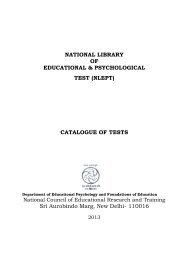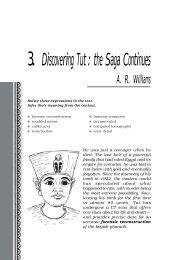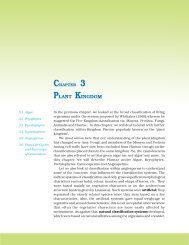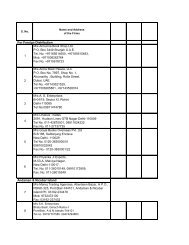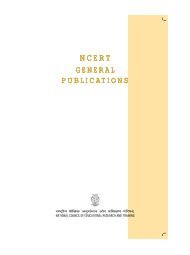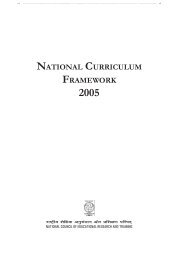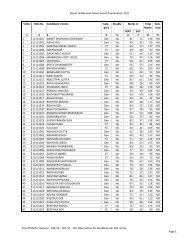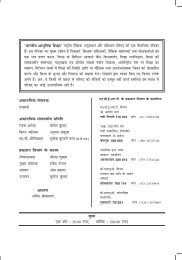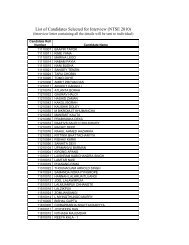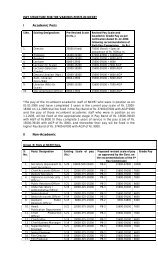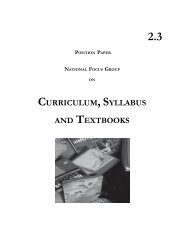Annual Report - National Council Of Educational Research And ...
Annual Report - National Council Of Educational Research And ...
Annual Report - National Council Of Educational Research And ...
You also want an ePaper? Increase the reach of your titles
YUMPU automatically turns print PDFs into web optimized ePapers that Google loves.
NCERT<br />
20<br />
questions: to what extent has Aadhar been implemented as intended in the state?<br />
what has been the impact of Aadhar in improving the learning levels in language<br />
and arithmetic of primary school students; and are there any unintended<br />
outcomes attributable to the programme? Total number of 210 schools were<br />
randomly selected from 7 out of 12 districts in the state. From these schools all<br />
the children studying in Class III comprised the sample of the study. Qualitative<br />
data was collected from a sub sample of 70 schools and focus groups with the<br />
community from 21 school sites. A number of instruments such as questionnaires,<br />
interview schedules, focus group discussions, rating scales for document review<br />
and field notes were developed to collect data from various groups of respondents.<br />
The findings indicated that many components of the programme were<br />
implemented. However, results also indicated that delay in distribution of material<br />
to schools led to late start of the programme in a number of schools. Evidence<br />
indicates a consistent improvement in learning levels of Class III students,<br />
including the year of 2008-9 in which Aadhar was not offered. These gains may<br />
be largely attributed to maturation of children and regular classroom teaching.<br />
Feedback from teachers, BRCs and CRCs indicates that the Aadhar strategies<br />
were perceived to have contributed to improving the learning levels of students.<br />
number of unintended gains and benefits were attributable to Aadhar. Positive<br />
outcomes reported included: behavioural and attitudinal changes in students,<br />
improved teacher-pupil relationships, pedagogical shifts in classroom practices,<br />
and increased parental preference for government schools. A few functionaries<br />
highlighted some negative outcomes, including reports that grouping older<br />
students with younger ones led to inferiority feelings in the former, and<br />
implementation of Aadhar resulted in less time for completion of the state syllabus,<br />
regular teaching and preparation of students for examinations.<br />
Activity Based Learning (ABL) in Tamil Nadu<br />
Activity Based Learning is a major quality initiative introduced by Tamil Nadu<br />
Sarva Shiksha Abhiyan. It is based on the pedagogical principle of learning<br />
through activities. ABL is implemented in Classes 1 to 4. Students in ABL classes<br />
use a variety of learning materials such as learning cards, learning ladders, Science<br />
and Mathematics kits and supplementary reading materials. Teaching-learning<br />
in ABL is meant to be child-centred. Teachers act as facilitators and children<br />
work with learning cards in six groups and move from the teacher supported<br />
group to the self evaluation group. In ABL, each child monitors his/her learning<br />
himself/herself and gets support from peers. The initiative was introduced in a<br />
phased manner. In the first phase, pilot test was conducted in 13 schools of<br />
Chennai Municipal Corporation in 2003-04. During the second phase, all 264<br />
schools of Chennai Corporation were brought under the purview of the ABL<br />
programme. In the third phase, in the year 2006-07, ABL was expanded to 4100<br />
schools; 10 schools in each block of Tamil Nadu. During the last phase, the ABL<br />
initiative was up scaled to about 37,500 schools, i.e., all schools run by Tamil<br />
Nadu State Government and the aided schools. study aimed to answer the four<br />
evaluation questions: Is ABL being implemented as intended? To what extent<br />
are ABL support systems (curriculum, teacher training and support and<br />
monitoring) effective in improving classroom practices; has ABL improved student<br />
achievement in different subject areas? <strong>And</strong>, what other (non-academic) outcomes<br />
are attributable to ABL?<br />
The study was conducted in 280 sample schools drawn from 13 districts in<br />
Tamil Nadu. The research data were collected from various stakeholders including<br />
<strong>Annual</strong> <strong>Report</strong> 2010-11



